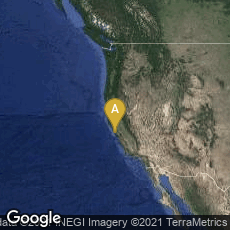

A: Pacifica, California, United States
In "The Three Breakthroughs That Have Finally Unleased AI on the World", Wired Magazine, October 27, 2014, writer Kevin Kelly of Pacifica, California explained how breakthroughs in cheap parallel computation, big data, and better algorithms were enabling new AI-based services that were previously the domain of sci-fi and academic white papers. Within the near future AI would play greater and greater roles in aspects of everyday life, in products like Watson developed by IBM, and products from Google, Facebook and other companies. More significant than these observations were Kelly's views about the impact that these developments would have on our lives and how we may understand the difference between machine and human intelligence:
"If AI can help humans become better chess players, it stands to reason that it can help us become better pilots, better doctors, better judges, better teachers. Most of the commercial work completed by AI will be done by special-purpose, narrowly focused software brains that can, for example, translate any language into any other language, but do little else. Drive a car, but not converse. Or recall every pixel of every video on YouTube but not anticipate your work routines. In the next 10 years, 99 percent of the artificial intelligence that you will interact with, directly or indirectly, will be nerdily autistic, supersmart specialists.
"In fact, this won't really be intelligence, at least not as we've come to think of it. Indeed, intelligence may be a liability—especially if by “intelligence” we mean our peculiar self-awareness, all our frantic loops of introspection and messy currents of self-consciousness. We want our self-driving car to be inhumanly focused on the road, not obsessing over an argument it had with the garage. The synthetic Dr. Watson at our hospital should be maniacal in its work, never wondering whether it should have majored in English instead. As AIs develop, we might have to engineer ways to prevent consciousness in them—and our most premium AI services will likely be advertised as consciousness-free.
"What we want instead of intelligence is artificial smartness. Unlike general intelligence, smartness is focused, measurable, specific. It also can think in ways completely different from human cognition. A cute example of this nonhuman thinking is a cool stunt that was performed at the South by Southwest festival in Austin, Texas, in March of this year. IBM researchers overlaid Watson with a culinary database comprising online recipes, USDA nutritional facts, and flavor research on what makes compounds taste pleasant. From this pile of data, Watson dreamed up novel dishes based on flavor profiles and patterns from existing dishes, and willing human chefs cooked them. One crowd favorite generated from Watson's mind was a tasty version of fish and chips using ceviche and fried plantains. For lunch at the IBM labs in Yorktown Heights I slurped down that one and another tasty Watson invention: Swiss/Thai asparagus quiche. Not bad! It's unlikely that either one would ever have occurred to humans.
"Nonhuman intelligence is not a bug, it's a feature. The chief virtue of AIs will be their alien intelligence. An AI will think about food differently than any chef, allowing us to think about food differently. Or to think about manufacturing materials differently. Or clothes. Or financial derivatives. Or any branch of science and art. The alienness of artificial intelligence will become more valuable to us than its speed or power. . . .